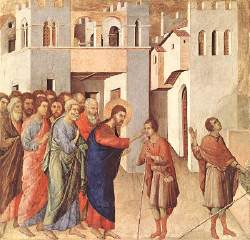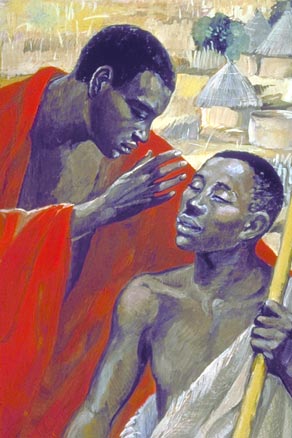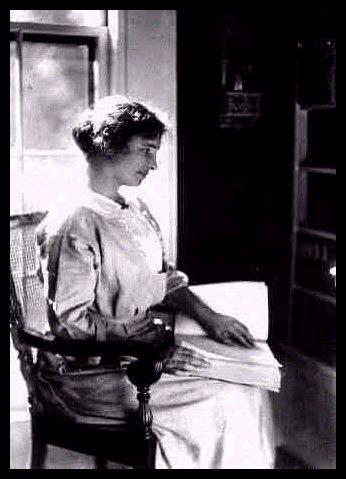
(Matthew 16:13-23)
May these words of this Peter be like a rock,
not a stumbling block!
|
|
"Who do you say
that I am?" Jesus asked. Simon Peter answered, "You
are the Messiah, the Son of the living God." And Jesus
answered, "Blessed are you, Simon son of Jonah! ... You are
Peter (petros), and on this rock (petra)
I will build my church..." Jesus then began to speak of
the rough road ahead. And Peter took him aside and rebuked him... "Get
behind me, Satan!" Jesus replied. "You are a stumbling
block..." (Matthew 16:13-23) May these words of this Peter be like a rock, |
"Hereís mud in your eye"
Message preached March 10, 2002
Long Green Valley Church of the Brethren
Glen Arm, Maryland USA
based upon John
9:1-41
Sometimes
in life, "getting well" is the easy part. "Staying well" may
be a bit more difficult. Take this story of the man born blind, who then was
healed by Jesus. It is a long, convoluted tale as John tells it. The actual
healing is simple, and very brief. The rest of the story however (of which we
have thus far only heard but 15 of 41 verses - a little over a third of it) is
complicated and deals with the reaction of people to this man "getting
well." Lest we grow smug and say, "those silly folks,  donít
they see whatís happening," let me assure you that we can be just as
silly as they. You see, this is not just a story about mud in one manís eyes.
Itís about everyone - including you and me - with mud in our eyes.
donít
they see whatís happening," let me assure you that we can be just as
silly as they. You see, this is not just a story about mud in one manís eyes.
Itís about everyone - including you and me - with mud in our eyes.
Letís explore the whole story. You heard how it all began. Along the way, Jesus saw this man who was blind from birth. It doesnít say this man came to Jesus requesting to be healed. It doesnít even say Jesus reached out to him. It just says that Jesus "saw" him. Apparently the disciples did also, and they asked the question that started the wheels rolling. "Rabbi, who sinned, this man or his parents, that he was born blind?"
Now, before you start responding, "what a silly thing to say!" realize that we make snap judgements like that all the time. What was the judgement here? That this manís condition was due to someoneís sin. You might reply to me that we donít blame people today for their illness, but I beg to differ. And, you know what, I donít necessarily believe that itís totally wrong to do so in every case. To someone who suffers from cancer, we donít blame them for the disease - but we certainly look for causes. For instance, the link between air pollution and lung cancer was again in the news this week. Is air pollution a sin? You bet. Itís a desecration of Godís creation. Who sinned? The polluters, right. Who are they? Look in the mirror, my friends.
Of course, then there is the case of a person who has been a long-time smoker. Do we say that it is their own fault if and when they then develop lung cancer? Well, yes and no. Itís getting a bit fuzzy, isnít it? And did I mention AIDS? Itís the "acquired" part of this "immune deficiency syndrome" that gives us fits. While we must say that persons can "acquire" this disease through innocent means - like a blood transfusion or through an unfaithful spouse, somewhere along the line someone made a wrong choice, even in that case. More often persons "acquire" this disease through questionable behavior.
The bigger picture, though, is that we live in a "fallen" world. It is not a perfect place. The doctrine of Original Sin is perhaps the easiest to observe, as theologian Reinhold Niebuhr used to say. All we have to do is read the newspaper... Tom Martin and I used to have a running debate about addictions. He asserted that alcoholism is a "disease" not a "sin." I agreed, but only in part, stating that I believe all disease has its roots in sin - not necessarily something "bad" someone has done, but "sin" in the sense of living in a broken and fallen world. Dealing with "sin" is a part of "getting well," as Jesus elsewhere revealed.
Even aside from "sin" we, in a sense, still blame people for not being well. When illness becomes chronic, or recovery takes a long time, impatience on the part of others (those who observe from a distance) can be a blame game. "Why doesnít she just pull herself up and get on with her life," we might wonder. "Heís using his illness just to get sympathy." When sickness tears apart a family, as it often does, we think they just werenít strong enough to survive. How many steps away is all of this from the discipleís question, "Rabbi, who sinned, this man or his parents, that he was born blind?" Not many.
In this
story, as in most of the stories about him in the Bible, as well as in most of
our experience today with the living Christ, Jesus shifted the focus of the
situation. This man was born blind, he said, "so that Godís works
might be revealed in  him."
Now, I donít believe Jesus was talking here about cause and effect, that God
made this man blind at birth so that he could be healed at this time by Jesus.
No, our Lord simply shifted the focus away from the infirmity, away the
disability, away from the "sin" even, in order to focus upon God. The
question isnít "how did this happen?" but rather "what can be
done with Godís help?" The answer? Come and see!
him."
Now, I donít believe Jesus was talking here about cause and effect, that God
made this man blind at birth so that he could be healed at this time by Jesus.
No, our Lord simply shifted the focus away from the infirmity, away the
disability, away from the "sin" even, in order to focus upon God. The
question isnít "how did this happen?" but rather "what can be
done with Godís help?" The answer? Come and see!
I think itís a real kick that Jesus used dirt and spit to heal this man. Wasnít it fun to explore that with the children this morning? Here the question was about dirt - you know, who sinned? Face it, this is a down-right dirty world, folks. So Jesus just took some of that dirt, mixed it with saliva and stuck it on the manís eyes. It became healing dirt! Just like God can take some of our "dirt" and do something with it. Weíve all got dirt, friends. Weíre all sinners. The difference is what God can do with that dirt. Yes, from the dust we were made - to dust we will one day return, these mortal bodies. Itís in the middle there, between "from" and "return," that God is at work. Even in very "earthy" ways. Healing happens even in unclean places and ways.
Actually, as I said, the healing was pretty simple for this man. He just washed off the dirt, as Jesus told him to, and he could see. "Getting well" was the easy part. "Staying well" was a bit more difficult. From here on this story is a bit like a comedy. He returns home a well man, no longer a beggar who once depended upon the pity of others. His neighbors didnít recognize him at first. Some thought he only just looked like the blind beggar. "I am ... me! ... I am the man!" he had to tell them. Well, "how did it happen?" They asked. "Spit and mud ... in my eyes, and I washed - there you are. Jesus did it." ... "Where is he?" ... "I dunnuh." When they brought this man before the Pharisees it became a three-ring circus.
All of a sudden the issue wasnít just "who sinned - the man or his parents?" but "who sinned - the man or his parents, or Jesus?" After all, this took place on the Sabbath, when people were supposed to rest, not mess around with dirt and spit and healing. Jesus must be a sinner, for he didnít do things in the proper way at the right time. Of course, some of the Pharisees did point out that the man was healed, and that was a good thing, wasnít it? "What do you have to say about this Jesus," they turned and asked the once blind man, who could only respond with a shrug, "Heís a prophet."
Not believing that something like this could happen, that maybe this was all a fake, they brought in this manís parents. "Was he really blind? How come he now sees?" His Mom and Dad, afraid because all of this was upsetting the way things once were, affirmed that he had, indeed, been born blind, but they didnít have a clue what happened. "Ask our son," they said. "Heís a grown man." Leave us out of it.
The Pharisees again turned to this once blind man, who was himself starting to lose patience. After all, the healing was simple, but staying that way wasnít. "Glorify God," they told him. "This Jesus is a sinner." ... "I donít know about that," he replied. "All I know is that I once was blind but now I see." ... "But what did Jesus do? How?" ... "I told you already. Why do you want to hear it again? Do you also want to become a disciple of his or something?"
This story is somewhat of a farce, for the blind person was not the one who once sat beside the road begging. The blind were those who just plain could not, or would not see what God was really doing. Sometimes, the mud gets in your eyes and you donít wash it away. You get used to the way things are, and you canít envision them any different. In fact, youíll fight to keep them the same way. Ask anyone who has "gotten well," especially after a long illness. Sometimes, "staying well" is harder than getting there, because people around you have built their lives around what you canít do, instead of what you can.
It was very appropriate that this past Friday morning I went into Tessaís second grade classroom to witness her giving a report on a book she read, a book about a famous person. Who was that person? Helen Keller. This amazing woman was not born blind, but when she was nineteen months old some mysterious illness (was it scarlet fever, or meningitis? - we donít know) took away both her sight and her ability to hear.
Perhaps
youíve seen the movie, "The Miracle Worker," or the stage version,
which tells the true story of how a teacher named Anne Sullivan helped transform
Helenís life. You see, Helenís family had gotten used to the ways things
were  with
this deaf and blind child. Though they longed for Helen to live a
"normal" life (so to speak), they let her pretty much run wild -
thinking she was incapable of anything different. Even though Anne herself was
sight impaired, she saw what was happening. She insisted on muddying
things up, if you will, providing the structure and discipline Helen needed,
insisting that this young girl was capable of much, much more. Mind you, the
family didnít like it. Helen didnít, either. It was changing the way things
were.
with
this deaf and blind child. Though they longed for Helen to live a
"normal" life (so to speak), they let her pretty much run wild -
thinking she was incapable of anything different. Even though Anne herself was
sight impaired, she saw what was happening. She insisted on muddying
things up, if you will, providing the structure and discipline Helen needed,
insisting that this young girl was capable of much, much more. Mind you, the
family didnít like it. Helen didnít, either. It was changing the way things
were.
But then the day came when a spark ignited in Helenís brain, and a word became flesh. That word was "water." No, neither Helenís eyes nor her ears were "healed," but she became able to see as she had never been able before. Life opened up to her. Understanding, communication, "light" entered her darkness. You could say that she did "get well." Of course, "staying well" in a world that could only see her disability was the hard part. Later in life, Helen became an advocate for the disabled. At times she said things people didnít want to hear. She had opinions, and wisdom - which she shared the rest of her life.
Back to our Bible story: the most important part of it was not that that manís outer blindness was literally healed. Significant, yes - but so-called "disabled people" (no matter what the cause of their disability, can be very able, they can be "well" and "whole" persons, as the story of Helen Keller makes clear - as the story of individuals among us here right now gives witness. No, the most important part of the Bible story was how that manís inner eyes (not just his physical eyes, but the eyes of his heart, mind, and spirit) were opened to the light of the world. You see, when it was just the two of them together later on, Jesus asked this fellow, "Do you believe in the Son of Man?" ... "Point him out to me, sir, so that I can believe in him." ... "Youíre looking right at him. Donít you recognize my voice?" ... "Lord, I believe."
Isnít that the important part for us all? Jesus said, "I came into the world to bring everything into the clear light of day, making all the distinctions clear, so that those who have never seen will see, and those who have made a great pretense of seeing will be exposed as blind." (John 9:39, The Message, p. 209) Therefore, the question for us all is, once again, "Do you believe...?" Well, folks, hereís mud in your eye.
©2002 Peter L. Haynes